About Doyle Law
Get Help NowConal Doyle talks about the types of cases the firm handles and the 3 things that set the firm apart including the importance of caring about clients. For more information about Doyle Law visit www.conaldoylelaw.com or call 310-385-0567.
Attorney: What we do here at the firm is represent people out of that incredibly serious injuries– amputation, death, spinal cord injuries– as well as insurance bad faith claims and a variety of civil litigation. What would kind of encapsulate our philosophy is that we believe in our cases and we care about our clients. We handle a select few cases at a time involving serious injury, so we can give each case special attention. There are three things that set our firm apart. The first and I think maybe the most important is we truly care about our clients.
Client 1: He really cares. He’s thinking about longevity. He’s not thinking about something temporary just to get me comfortable for the meanwhile. He wants me to be set for the rest of my life, and for my kids to be set. He really cares.
Attorney: And I think the second thing that sets us apart is trial experience. We try cases and we get record results.
Client 2: He’s received every award a trial lawyer can get. He’s been honored as the Trial Lawyer of the Year for Los Angeles, and he has received the California Lawyer of the Year award in human rights, among many others.
Attorney: And finally, the third thing I think that sets us apart is we really take a creative legal approach to the cases. There’s very, very few trial lawyers in the history of our country that have obtained seven-and eight-figure huge verdicts but also have argued complex legal issues before the United States Supreme Court, and we’ve done that.
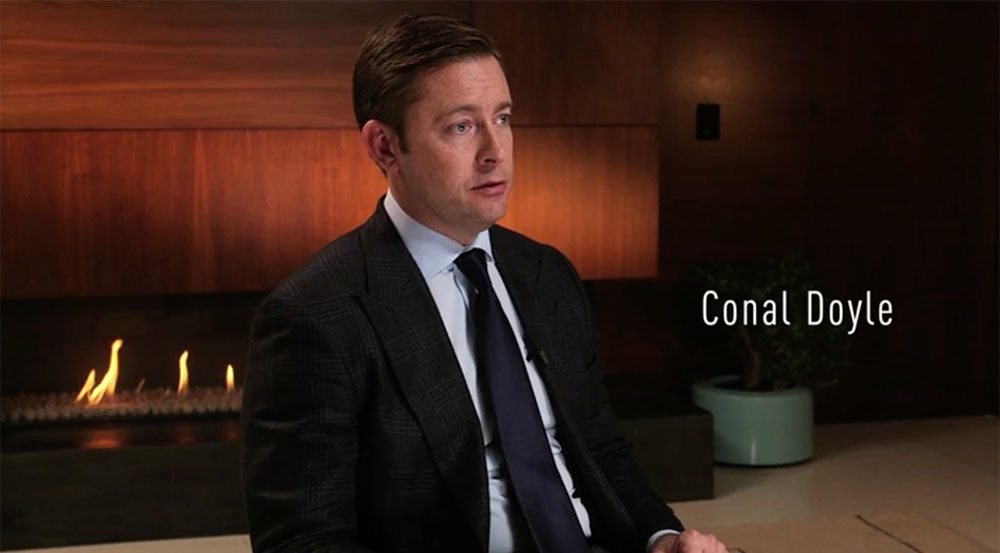
About Doyle Law
Conal Doyle talks about the types of cases the firm handles and the 3 things that set the firm apart including the importance of caring about clients. For more information about Doyle Law visit www.conaldoylelaw.com or call 310-385-0567.
Attorney: What we do here at the firm is represent people out of that incredibly serious injuries– amputation, death, spinal cord injuries– as well as insurance bad faith claims and a variety of civil litigation. What would kind of encapsulate our philosophy is that we believe in our cases and we care about our clients. We handle a select few cases at a time involving serious injury, so we can give each case special attention. There are three things that set our firm apart. The first and I think maybe the most important is we truly care about our clients.
Client 1: He really cares. He’s thinking about longevity. He’s not thinking about something temporary just to get me comfortable for the meanwhile. He wants me to be set for the rest of my life, and for my kids to be set. He really cares.
Attorney: And I think the second thing that sets us apart is trial experience. We try cases and we get record results.
Client 2: He’s received every award a trial lawyer can get. He’s been honored as the Trial Lawyer of the Year for Los Angeles, and he has received the California Lawyer of the Year award in human rights, among many others.
Attorney: And finally, the third thing I think that sets us apart is we really take a creative legal approach to the cases. There’s very, very few trial lawyers in the history of our country that have obtained seven-and eight-figure huge verdicts but also have argued complex legal issues before the United States Supreme Court, and we’ve done that.
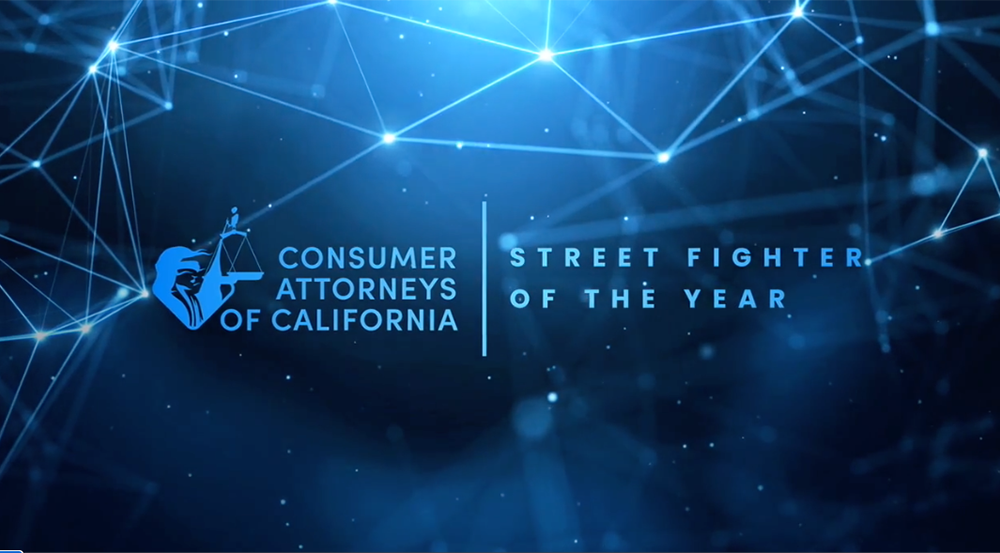
Street Fighter of the Year Award
Conal Doyle Wins Prestigious “Streetfighter of the Year” Award
This is a case that’s really personal for me I’ve been an amputee my whole life and for about the last 15 years I have been devoting a significant portion of my practice and a lot of the pro bono to representing amputees and claims against insurance companies to try to get them prosthetic devices the insurance industry unfortunately has been taking advantage of a law called ERISA which provides a ton of protections for insurance companies in adjudicating insurance claims health insurance claims so with an ERISA claim there’s no jury trial there’s no punitive damages there’s no general damages and the only remedy you can get is to actually get paid the device or the medical product that was denied in the first instance so as a result insurance companies have very little incentive to honestly and timely process claims I’ve been tracking kind of what the insurance industry has been doing for years and they have come up with creative ways to delay and deny payment of valid and timely meritorious health insurance claims this case had a significant impact on amputee healthcare nationwide united healthcare was the largest health insurer in the country and this case forced them to revamp their unlawful claims practices and provide both retrospective and prospective relief it was really gratifying to me as an amputee to go to my clients and tell them look you know you can get your leg you can catch your arm you can go back and lead like a normal life and just have the basic decency and dignity that you really should be entitled to when you buy insurance
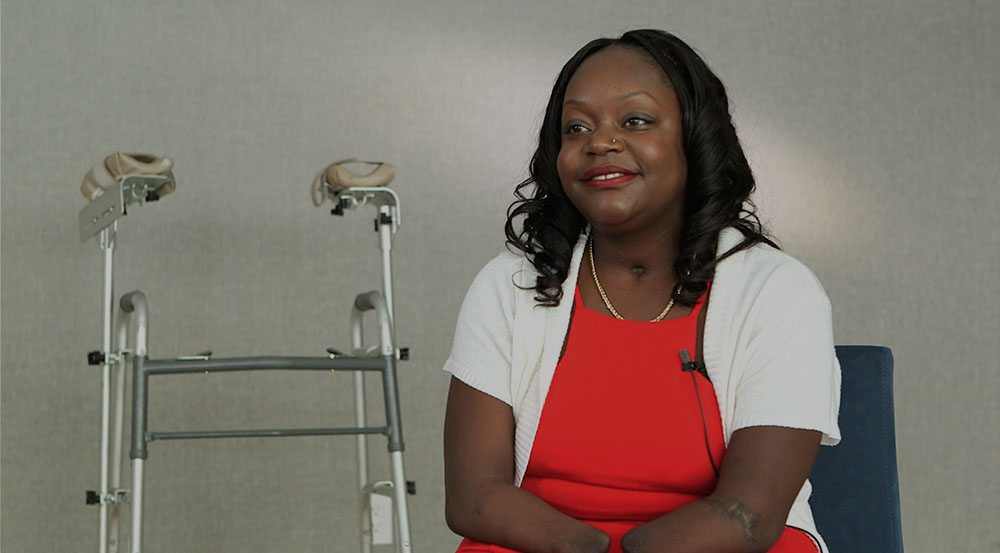
How to Choose a Law Firm
Conal Doyle of Doyle Law speaks of the three most important things to look for when choosing a lawyer and a law firm to represent you. www.conaldoylelaw.com or call 310-385-0567.
ATTORNEY: The decision of the lawyer or the law firm that you choose to represent you is going to make every difference in your case. I think there’s three really important things to look for. The first is trial experience. Unfortunately, there’s a lot of lawyers out there that are just advertisers. There’s law firms out there that pay a lot of money on the internet to be upfront on Google, and those aren’t necessarily real trial lawyers. So you need to make sure you ask any lawyer that you go to work with, what was the last case you tried? And if they can’t answer that question immediately, that’s a red flag. Because here’s the thing. If a firm doesn’t try cases, you’re not going to get paid full and fair compensation on your case. Now, second, there’s two major legal rating services that have been around for a very long time that are universally recognized in our business as authoritative. And they’re Super Lawyers and Best Lawyers. Whatever firm that you go with, make sure that they’re both a Super Lawyer and a Best Lawyer. And finally the third thing that you really need to look at is, is a lawyer that you’re going to hire to handle your case, are they recognized by their peers in terms of a Trial Lawyer of the Year award? Have they been written up in legal publications for their work?
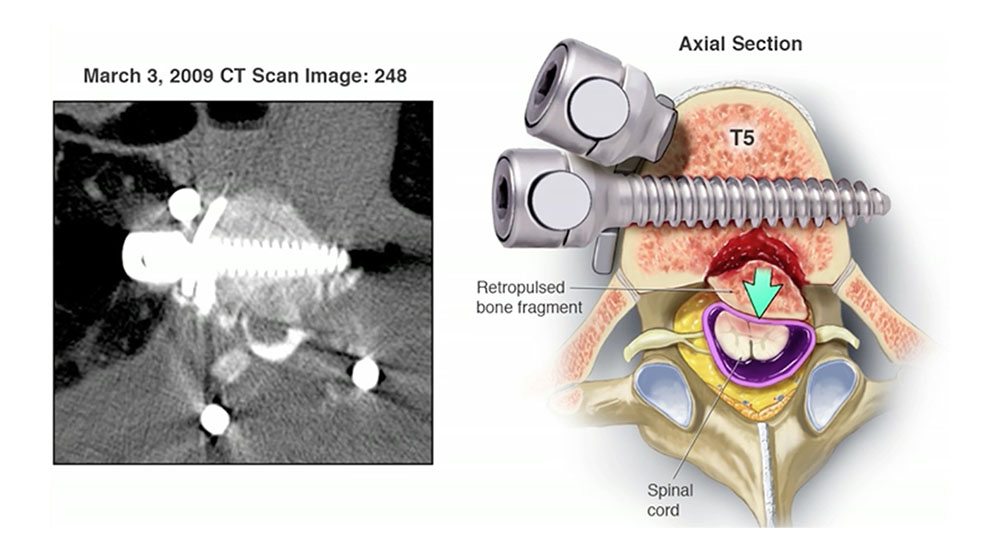
Spinal Cord Injuries
Conal Doyle speaks on the devastation of spinal cord injuries. www.conaldoylelaw.com or call 310-385-0567.
ATTORNEY: Spinal cord injuries are probably the most devastating injury that someone can get. Spinal cord is contained within the spinal canal and is very delicate. And if there is compression or injury to the spinal cord, somebody can get severe neurological problems, and that means in layman’s terms, you can be paralyzed. I recently had the pleasure of representing a wonderful woman who was rendered a paraplegic due to medical malpractice. She was going in for a redo surgery up in Bakersfield, California and these neurodiagnostic monitoring technicians didn’t do their job until the surgeon that both fragment had come through out of her spine and into her spinal cord. As a result she woke up with no feeling in her legs and never regained it. I did a month long trial as lead trial counsel in November and December of 2013. At the end of the trial, the jury rendered a verdict that was really heard around California. It was the highest medical malpractice verdict in Kern County history, $26.8 million. After it was settled on appeal, total recovery was $17 million, which was one of the largest, if not the largest, actual recoveries for medical malpractice plaintiff in California history.
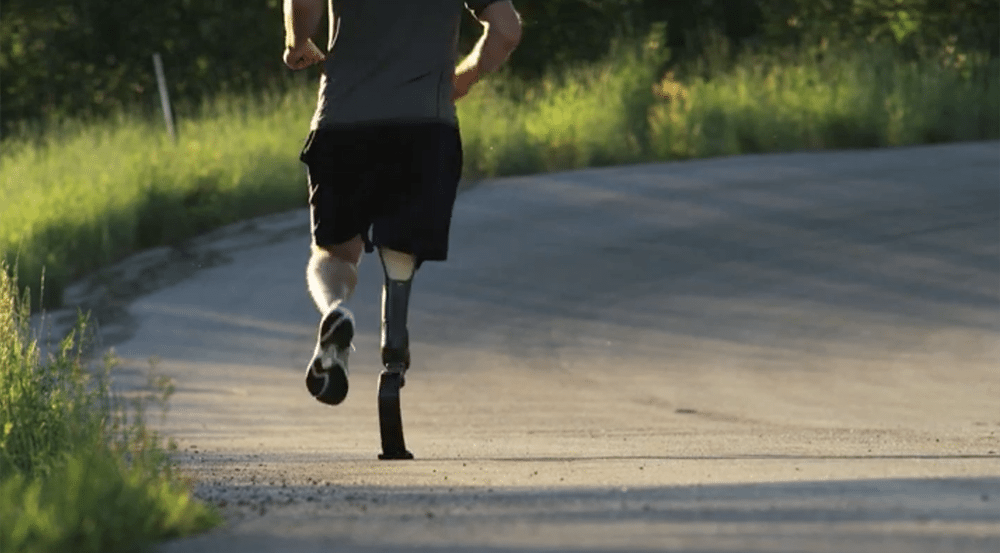
Doyle Law on Representing Amputees
Conal Doyle talks about the importance of representing amputees and handling the denial of insurance benefits, along with his personal connection to these cases. For more information about Doyle Law visit www.conaldoylelaw.com or call 310-385-0567.
ATTORNEY: One of the main focuses– and this remains the main focus– is representing the special needs of amputees in litigation involving injury, where an amputee lost their land to the negligence of, maybe it could be a truck driver, it could be a motorcycle accident, a construction accident, workplace accident, or medical malpractice, or product defect. And then the second category of cases that we handle is cases where– They’re called first party bad faith insurance case. It’s when an insurance company denies a benefit that they’re insurers have paid for in premiums for years, and years, and years in their monthly premiums. In our cases, we see insurance companies saying that a prosthetic leg, for god sakes, is not medically necessary. And we go after those insurance companies to get our clients the prosthetic devices that they need to lead their lives and to get full and fair compensation. I was born without my right leg, and so for well over 40 years I’ve sort of stood in the shoes of a lot of my clients. I understand where they’re coming from. I understand some of their daily struggles because I have those same struggles. I think it gives me an empathy, and a passion, and a compassion that drives me to work the nights and the weekends to make sure that they get justice.
Client Testimonials
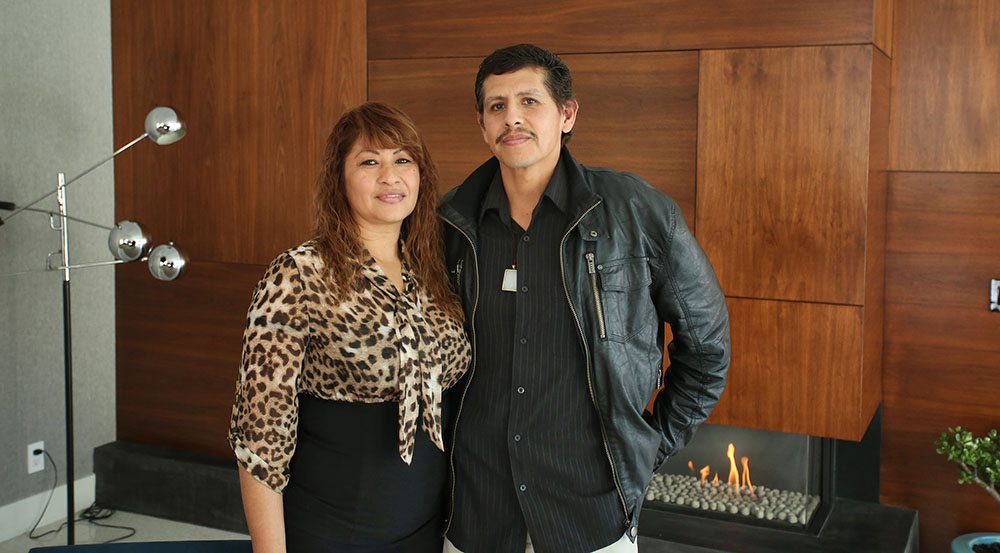
Francisco Castañeda’s Sister Tells Their Story
Yanira Castañeda shares her brother’s story and how Conal and Doyle Law provided them justice and how their story affected others immigrants. Visit www.conaldoylelaw.com or call 310-385-0567 to find out how you can get help.
CLIENT: My brother Francisco was in jail. And he had some terrible disease. And he got in touch with Conal. I guess he first went through a lot of lawyers. But I guess he found something in Conal that he didn’t see in no one else. He was very trustworthy. You could talk to him any time. I had his personal cell phone, and I could call him any time I want. Conal took this case and argued forward to the Supreme Court. To go to the Supreme Court with Conal– it was a big challenge. I was– I don’t know– I felt nervous. Scared. But I knew that he was a good lawyer, so I trusted him. Yeah, I was very happy with the way he represented us. He got justice for us. He touched my life, like, in a positive way, because now I know that there’s people that care for other people, which– I didn’t think that before. You know, now he’s showed me that there’s people that do care for others. To me, he was my hero, because he not only got justice for me– for my brother, for my family, and for other people that was around us. Because now they know that, just because we’re from other place– not from USA– that doesn’t mean that we can’t get justice. So, yeah. There’s justice in here. And there’s people like him that fight for us. The jury came back and awarded us with every penny that Conal asked for. I don’t see him as my lawyer, now. I see him as a friend. Because, I mean, I had his cell phone, like I said. And I call him, and we talk to each other as friends.
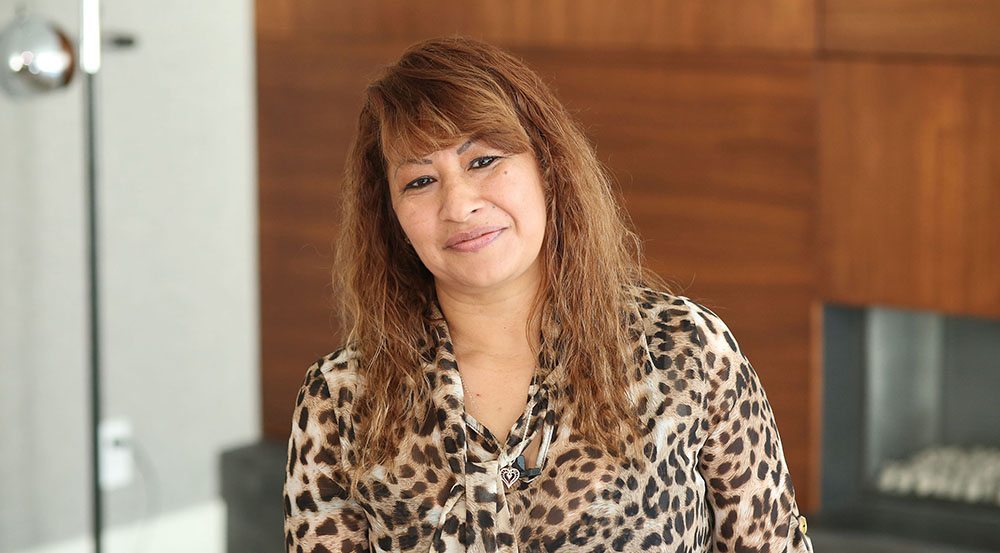
CasLa hermana de Francisco Castañeda cuenta su historia
Yanira Castañeda comparte la historia de su hermano y cómo Conal Doyle y la Ley les proporcionó la justicia y cómo su historia afectó a otros inmigrantes . Visite o llame al 310-385-0567 www.conaldoylelaw.com para averiguar cómo puede obtener ayuda
CLIENT: Mi hermano estaba en la cárcel, por cualquier motivo que estaba en la cárcel, estaba enfermo y no le dieron la atención que necesitaba. Así que busco abogados, y abogados. Y hasta que encontró a Conal. Creo que Conal tiene algo diferente a los otros. Él es– se da a conocer, a querer. Y es muy fácil de platicar con él. Muy llevadero. Justicia me gusta que nos agarró justicia. No más importa el dinero, pero la justicia. Y eso es lo que hizo por nosotros. Agarró justicia. Y no sólo para mí, sino que para mucha gente. Muy contenta, estuve muy contenta con el resultado del caso. Como dije, no sólo por el dinero, sino que por la justicia que hubo y por la confianza que el nos dio. Nos demostró que hay gente buena en el mundo en que podemos confiar. En veces uno piensa que toda la gente es mala. Pero no, hay gente buena como Conal que está dispuesta a ayudar a otros. Está disponible los siete días, las veinticuatro horas. Tengo su celular privado y le puedo hablar cuando yo quiera. Y me contesta las preguntas cuando yo le digo. Conal fue conmigo hasta la Corte Suprema y pelió conmigo hasta agarrar justicia. Así cuando ví a Conal en el tribunal, estaba peleando por nosotros, estaba de parte de mi lado. Estaba orgullosa yo de que Conal estuviera representándome. Porque se que es un buen abogado. Porque sé que pelea duro. Porque sé que no se da por vencido. Y porque está de mí lado lo miraba yo como un heroe. Lo que promete lo cumple.
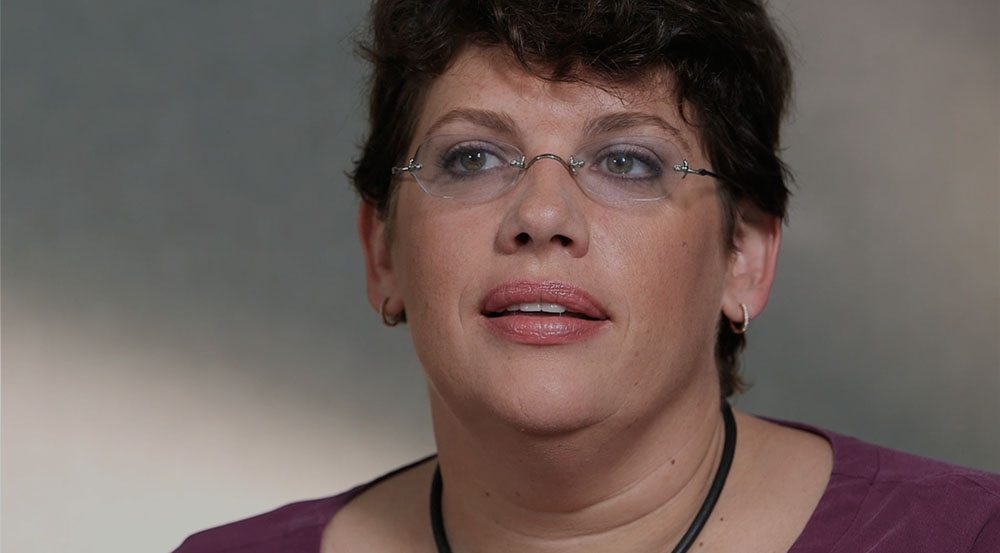
Stefanie Funke Testimonial
Stefanie Funke speaks of working with Conal Doyle and how he went beyond the call of duty to get a sea leg from her insurance company. www.conaldoylelaw.com or call 310-385-0567
CLIENT: I’m Stefanie Funke. I was trying to get a sea leg from my health insurance, and they kept turning me down until I learned about Conal. I called him, and he met with me really quickly. The next day we met. He talked to me about the case, and I felt that he had experience and knowledge. He kept me informed. He would call me and update me on what was going on. He seemed to go beyond the call of duty, meeting with my prosthetist and loaning me his old sea leg. So meeting Conal and feeling hope that I could get the microprocessor knee and then getting it contributed greatly to this process of me looking forward and actually getting back into life. Working with Conal on the microprocessor knee has just given me a sense of confidence to face the world and try to make the life I want to live instead of– so my focus is on how to do what I want to do rather than all the things I can’t do.
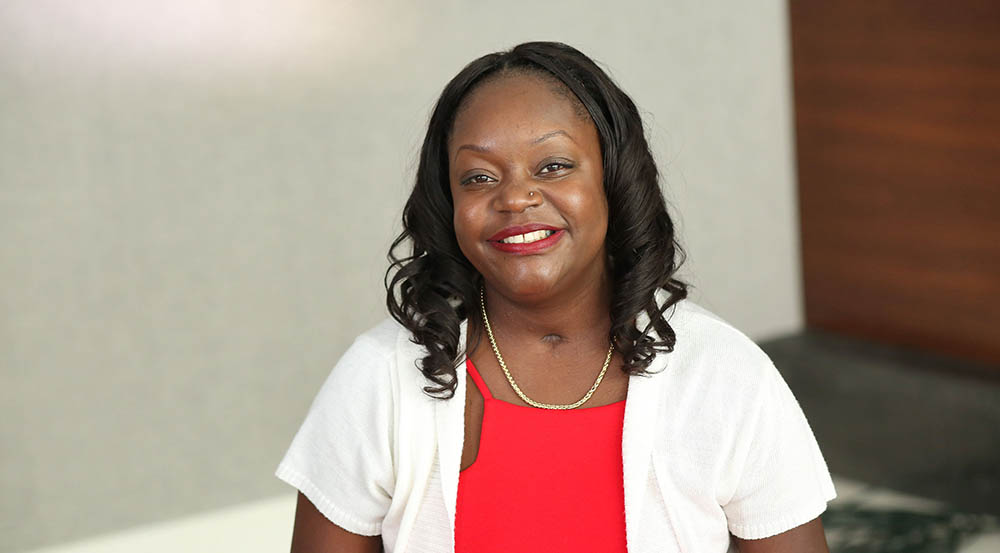
Charline Pericles Testimonial
Charline Pericles speaks of how Conal Doyle stood by her side and fought to get her the prosthetic she needed to live a full life. www.conaldoylelaw.com or call 310-385-0567.
CLIENT: My name is Charline Pericles. When I was 27 years old, I went to the hospital for a stomachache. It turns out it was kidney stones, which led to my– to complications. And before I knew it, I was a amputee. Right away, someone came down to the house and did a depo on us and got my story. And before I knew it, Conal got me some money to get my prosthesis and start getting on my feet. I started getting therapy. He directed me to the right prosthetic clinics that could help better assist me. He even sent me down to Florida to even get more help. So you know, it was just a blessing. Conal was just like an angel that came into my life. And seeing him as an amputee as well, oh, my gosh. He knows exactly what I’m going through, what I feel– how I feel. He knows that there’s no amount of money that can compensate to what happened to me, but he just wants me to be comfortable. And that’s a man of God right there. He’s fighting for me. He’s limping around the courtroom to fight for me. That this is just truly a honor, and I just– I thank God for him. He really represented me in a good way and showed these people that I’m young. I have a long life ahead of me. I need these prosthesis, and I want them. I want to get back up again. He let them know how critical my situation is. Like, it’s not easy. I’m stuck like this for the rest of my life, and I have two kids that depend on me. It’s really hard. So I’m really lucky to have Conal on my side. Anybody is lucky to have a lawyer like him around. We need more lawyers like him. [MUSIC PLAYING]
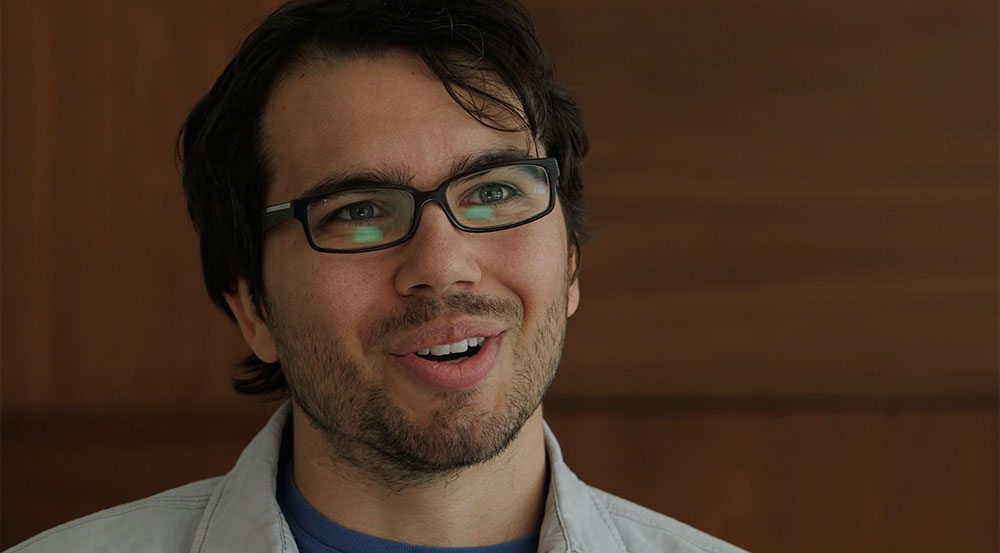
Zachary Rukavina Testimonial
Zachary Rukavina talks about working with Conal Doyle to get a prosthetic arm after being denied twice by his insurance company. www.conaldoylelaw.com or call 310-385-0567
CLIENT: In 2011, I lost my arm. And after I lost my arm, I started working with a company, because I would need a prosthesis to help live a more normal life. So I went and took all the right steps that anybody would with their insurance company. And I applied and showed the reasons why a prosthesis was very important. The very first time they denied me. And I was told, well, that’s kind of standard that they deny you the first time. I didn’t quite understand that, because I’ve been paying monthly for my insurance company. I applied again, and I got denied again. And at this point, there was just no reason why they kept denying me. And I felt like anybody would at that point. You feel pretty helpless. Even working with a company that works with insurance companies all the time, didn’t have an answer. And they felt powerless. And that’s when they said, well, we have another option. We know this great lawyer, named Conal Doyle. The reason why I picked Conal, he’s very straightforward. He looks you in the eyes. He tells you how it is. And he gave an honest opinion on what it would be. And then we just took that ride together, and I trusted that. He said, there could be room for more, but I’m going to tell you, I can definitely get you your prosthetic. And that’s what he delivered on for sure. The financial part of the settlement, definitely exceeded what he thought. And that was awesome.
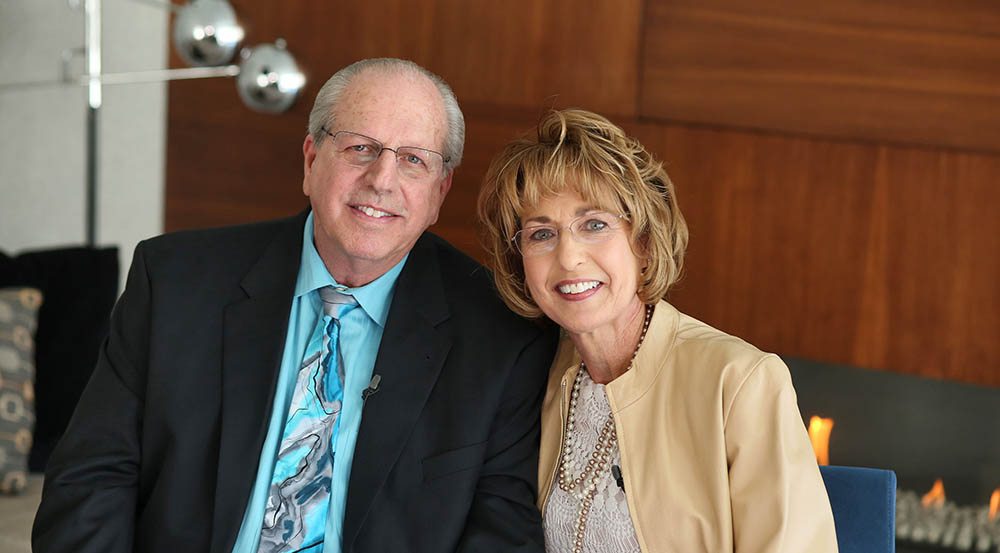
Simone & Carol Testimonial
Simone and Carol provide their testimonial for Conal Doyle, speaking to the professionalism of Conal Doyle and the staff at Doyle Law. www.conaldoylelaw.com or call 310-385-0567.
CLIENT 1: I’ve been a lawyer for over 35 years, and I knew the difficulty of our particular case. We were in a bad automobile accident. My wife had to have a 9 and 1/2 hour surgery. There was a lot of sensitivity involved, and we tried to find somebody that could handle all that with professionalism and quickness because I didn’t think my wife can handle a long, drawn-out trial. And we found Conal. The law firm has just been absolutely terrific. They handled everything. I couldn’t imagine it being handled any more professionally, any more quickly, and getting the results that they achieved. It was unbelievable. I couldn’t be more satisfied. The reputation that Doyle Law has and the staff, they handle things with a lot of power. They wield a lot of power when they talk to insurance adjusters, when they talk to the court, and that went a long way to get things done very quickly. Conal is extremely trustworthy and honest, and everything he told us and his reputation with others in the insurance industry is extremely honest and very trustworthy, yes. The result that we received was well
CLIENT 2: Well
CLIENT 1: –beyond our expectations. [MUSIC PLAYING]

Charline Sings
Charline is an amputee that Doyle Law represented. For more on Charline’s story visit www.conaldoylelaw.com or call 310-385-0567
CLIENT: I’m sorry. I’m nervous. [LAUGHS] ATTORNEY: [INAUDIBLE]. CLIENT: [SIGHS] OK. ATTORNEY: Just pretend we’re all naked. [INAUDIBLE]. CLIENT: [SINGING] My baby, you make me happy when I’m with you. And I’m so glad I found you. There would be no me without you. Don’t let me out your sight. I’ll be with you every day and midnight. Be with you throughout life to do the things I’d like to do for you. Just because our love’s like doves, there’s nothing more to that. We trust each other. The stormy weather becomes more when you’re holding me. [CHEERS AND APPLAUSE]
Doyle Law In The News
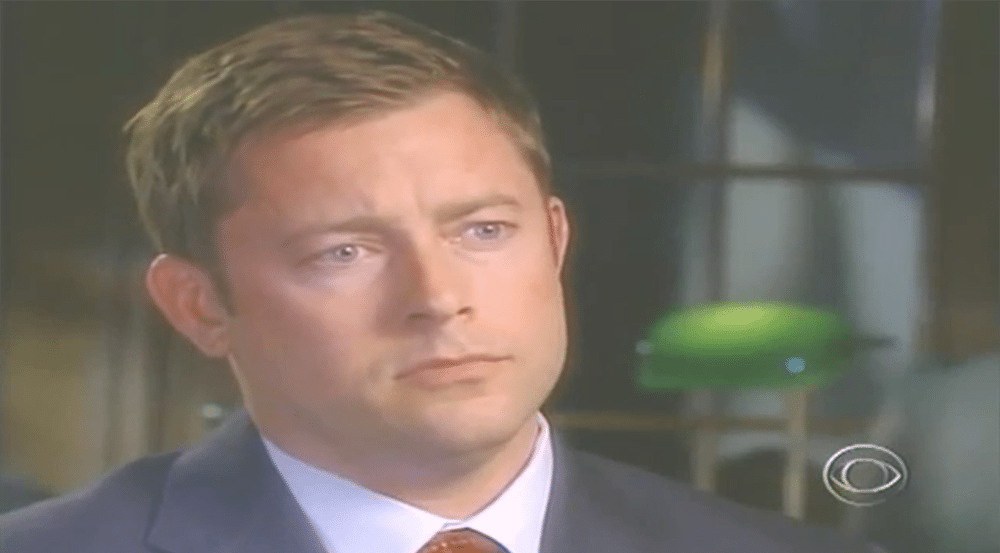
Conal Doyle on 60 Minutes
Conal Doyle shares Francisco Castañeda’s story and the legal action against DIHS. Their lack of medical care lead to his health deteriorating and eventually his death. To contact Doyle Law visit www.conaldoylelaw.com or call 310-385-0567.
DANA PRIEST: The little money managed care may save in the short run is going to be dwarfed by the millions that will be paid out by ICE when the lawsuits roll in. There have been just a handful of lawsuits so far, but they know they’re sitting on a powder keg.
FRANCISCO CASTANEDA: My name is Francisco Castaneda.
SCOTT PELLEY: DIHS is being sued in the case of 35-year-old Francisco Castaneda, seen here on his deathbed. Castaneda immigrated illegally from El Salvador at the age of 10. In 2004, he spent a few months in jail for drug possession. Then he was sent to a detention center for deportation. When you look back on how he was treated at the detention center over those months, what do you think?
YANIRA CASTANEDA: I’m mad– sad.
SCOTT PELLEY: Castaneda’s sister, Yanira, says her brother went into the detention center with a bleeding lesion on his genitals. There was concern that it was cancer, but the DIHS turned down requests for a biopsy. Conal Doyle is the Castaneda family lawyer. How long do you believe the DIHS staff in the detention center knew or had a reasonable reason to suspect that he had cancer?
CONAL DOYLE: The second day he entered the facility, of March 28, 2006, a physician’s assistant, Lieutenant Walker, specifically documented that he needed a urology consult and a biopsy to rule out cancer.
SCOTT PELLEY: And how long was it before he got that biopsy?
CONAL DOYLE: He never got it during his detention.
SCOTT PELLEY: Castaneda filed grievances with the Division of Immigration Health Services. He wrote, “I am in a considerable amount of pain and I am in desperate need of medical attention.” DIHS said that the surgery was elective. And the government wouldn’t pay for it. His request was denied for 10 months. Then, for reasons that aren’t clear, he was simply released.
CONAL DOYLE: They released him on February 5, 2007. And he sought care on his own outside the facility– and had that biopsy on February 8. Cancer was discovered. His penis was amputated on February 14.
SCOTT PELLEY: But the cancer had already spread. And Francisco Castaneda died a year later.
CONAL DOYLE: The judge, in this case, of federal district court has entered an order, describing the care received by Castaneda as transcending negligence by miles and being beyond cruel and unusual.
SCOTT PELLEY: Immigration and Customs Enforcement declined an interview, but ICE did send us this letter, which says, in part, “the number of deaths per 100,000 is dramatically lower for ICE detainees than for US prison and jail populations.” Ice goes on to say that, “the nation, as a whole, is experiencing severe shortages in qualified health professionals.” In October, the Congress held hearings on immigrant health care. And a senior immigration official, Gary Mead told the Congress that ICE provides, quote, “state-of-the-art medical care and the best possible health care.” End quote.
GARY MEAD: Last year, DIHS completed over 500,000 medical visits for the detainees in our custody. Many of our detainees receive almost daily attention. So it’s an aggressive program. And we do everything possible to maintain the best quality of life for the detainees in our custody.
SCOTT PELLEY: ICE declined to talk about the detainees in our story. In the case of Reverend Dantica, a government Inspector General’s report said that there was no evidence of mistreatment or malfeasance in his death. The Castaneda family is continuing to pursue its lawsuit. What does the DIHS owe prisoners like Francisco Castaneda?
CONAL DOYLE: Well, if the government is going to detain someone, it’s very clear. The Supreme Court has said that they are entitled to reasonable medical care, and that includes medical care for any serious medical need.
SCOTT PELLEY: You know that there are people watching this interview who are saying to themselves, Castaneda was an illegal immigrant. He had a drug conviction. The people of the United States owed him nothing.
CONAL DOYLE: I’m sure there’s people out there that think that. But t But that’s not what the law is, and that’s not what a civilized society does. And if it’s true that you judge the degree of civilization in a society by entering its prisons, the United States has a long way to go on this particular issue.
SCOTT PELLEY: Two weeks ago, DIHS admitted to a federal court that it was medically negligent in its treatment of Francisco Castaneda. Now, Congress is considering a bill to set new standards for immigrant detainee health care.
NARRATOR: To learn more, go to cbsnews.com or the washingtonpost.com/carelessdetention.
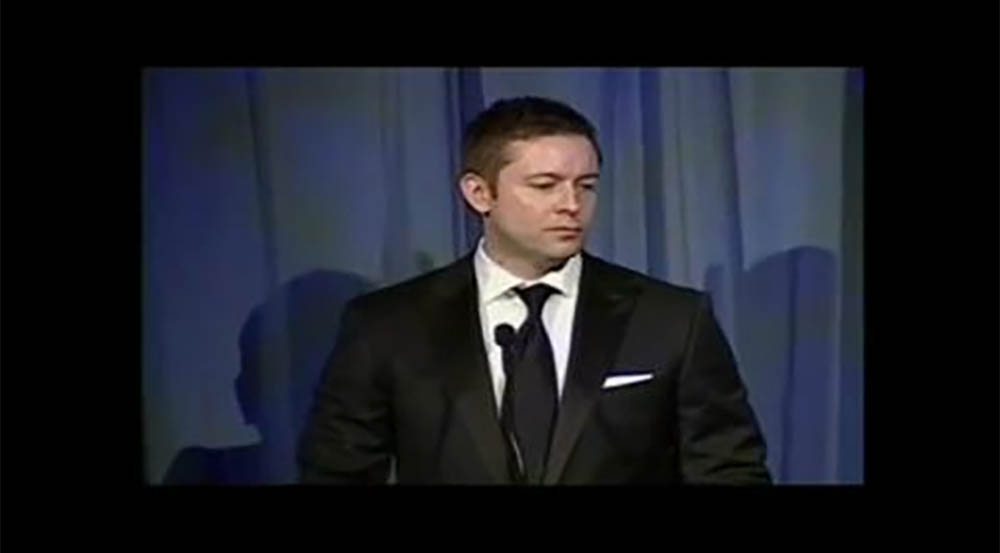
2011 Consumer Attorney of the Year Presentation to Conal Doyle
Tom Dempsey and Conal Doyle speak at the presentation of the 2011 Consumer Attorney of the Year award ceremony. Doyle Law – www.conaldoylelaw.com – 310-385-0567
ATTORNEY 1: Ladies and gentlemen, please welcome Consumer Attorneys Association of Los Angeles 1993 President, Tom Dempsey. [APPLAUSE]
ATTORNEY 2: Good evening. I want to thank everybody for coming also. This is always a great event. It’s just always terrific. Tonight’s honoree, Conal Doyle, I met approximately 4.5 years ago. At that time, I was the president of [INAUDIBLE] for Public Justice, as it was called that time, something Bruce [INAUDIBLE] got me involved in. And we had a client by the name of Francisco Castaneda, who was in federal custody with the Immigration and Consumer Enforcement. The acronym is ICE, and what an appropriate acronym. They are some of the most cold hearted people I have ever come across. In any event, Conal had a national practice–a very lucrative national practice. But he was based principally in California. And he had some unique experience in that he tried both civil rights and medical malpractice cases. And that’s what this was about. These are exactly the skills that we were looking for. So Conal was recruited as lead counsel to work with various attorneys with public justice. Let me give you just a little background summary of the case. Francisco had come to this country with his parents at 10 years old, over the years, had gotten in some trouble, and was actually in state custody. He was arrested, and developed a lesion on his penis. It continued to get worse, and a biopsy to determine whether this was any cancerous condition was recommended. Well the state never got around to it. He was then transferred to federal authorities to determine whether or not he would be deported. The condition kept getting worse. The lesion got more aggravated, got more ugly, got more painful. Obviously, it was something serious. Under the federal government, however, when you’re an immigration detainee, that system only provides what’s called extraordinary medical care, such as a biopsy, if you have an injury or an illness that it requires extraordinary care and is threatening to life and limb. Well, of course, until they had the biopsy, you couldn’t tell whether cancer, which would be deadly, was his condition. And he couldn’t get the extraordinary care. So in this Kafkaskian nightmare that he went through for months and months. I think it ended up being something like 14 months– the emotional and psychological damage that was being done to him, as well as the physical of having this festering condition, pleading for a biopsy, and nobody being able to give it to you because of this catch-22 situation. Well, Conal took over this case, and it became a quest– a quest to change this unbelievably unjust situation. Filed in state court, filed in federal court two parallel claims. In the federal court, the government made a motion to dismiss the case on immunities. It was denied. Judge Pregerson, a very, very good judge, described this situation as being, quote unquote, the definition of cruel, unusual punishment. Winning at the district court, they appealed to the Ninth district. We won there again. Well, it just so happens that the nation, the United States, was becoming more interested in the abuses in the federal immigration detention situations. In this very hotel, Conal and I said down with Scott Pelley of 60 Minutes and gave an interview that was actually played on 60 Minutes about not only this case, but other cases, where immigration detainees were being abused in one form or another. As the national interest grew in this, LA Times had articles, New York Times had articles. The Washington Post actually started a whole investigative study on this. And in addition to being barraged by paper, by numerous depositions– Conal must’ve taken 20, 30, 40 depositions, some of which he’d be the only plaintiff’s attorney, and there’d be 12 other attorneys representing various aspects of the government, he would get threatening phone calls. Anything like this brings out sometimes the worst in people, and the anti-immigration forces were sending death threats to him. How can you represent somebody that doesn’t belong in this country to begin with? They deserve whatever they get, et cetera, et cetera, et cetera. Having won at the Ninth Circuit, we moved on to the Supreme Court. And unlike the Supreme Court, when I went to law school, as being the court of last resort, where whatever happened to you in the lower courts, there, you were going to find justice. Here, Conal actually succeeded in uniting that court. It was a 9.0 verdict against us. Unbelievable, but that’s the way it was. Now, many attorneys at that point would have packed up their tent said, you know what? I’m dropping this case. I’m going to take a settlement for whatever I can get. I’m out of here. Not Conal Doyle. He doggedly kept at this, deposition after deposition, building evidence, evidence, evidence, until finally, November, 2010, went to trial in the case, on the state case. And going into the case, before the Supreme Court decision, the offer had been from the state, about $100,000. Now, for the Supreme Court decision, apparently it was in bold the state attorneys, and dropped it to $10,000. So going to the trial, he had a $10,000 offer. Well, fortunately, the jury didn’t see it that way and came back with a seven figure verdict. Shortly after that, the government got cold feet, United States, and they settled for a seven figure verdict. But that wasn’t the point. The point was the government changed that policy. Immigration detainees now have the right to medical care. The quest was fulfilled. Conal succeeded in enumerate immigration detainees not suffering the same kind of emotional, psychological, and physical injury that Francisco did. We’ve been bombarded over the last years, and years, and years about trial attorney bar organizations being nothing but a bunch of self-serving, self-interested, greedy, money grubbing trial lawyers. Tonight, at least for tonight, that myth has been destroyed. All the propagandizing of the public has been destroyed. It is so significant that CAALA chose a trial attorney who gave extraordinary time, effort, financial support to someone who, in our society, is probably among the weakest and the most vulnerable. Somebody whose voice would not be heard in our judicial system or anywhere else, but for Conal Doyle. I take great pride in awarding tonight, or presenting tonight, to Conal Doyle the 2011 Charlie O’Reilly Trial Lawyer Of the Year Award. Conal– And Charlie, wherever you are, you’ve got to be smiling, because it’s one of your [INAUDIBLE] that is getting this award, another Irishman. [APPLAUSE]
ATTORNEY 3: Tom, thank you very much for those kind words. I’m always a little bit uncomfortable being recognized like this, because in our business when you get an award like this, it means that a family has suffered a tragedy. And that’s certainly true in this case. And the Castaneda family, Francisco’s daughter, Vanessa, and his sister, [? Yani, ?] are here with us tonight. Thank you. [APPLAUSE] [? Yani, ?] Vanessa, thank you for allowing me to enjoy this award tonight. And tonight is a special night, because there’s no higher praise than being recognized by your peers. And this award, in particular, is undoubtedly one of the highest honors any trial lawyer can receive. But we’re here tonight to recognize and celebrate the great power and responsibility that we all have to affect change through the courts. And the courts really are the great equalizer. I think they are the last frontier, the one place where money and politics can’t buy justice. And for me, the Castaneda cases epitomize the power of the courts and the daily struggles that we all go through to bring justice to our clients. But before I talk about the cases, some well deserved acknowledgements are in order. First, I’d like to thank the CAALA board of directors. I know that many of you didn’t know me very well, and some, not at all, when you voted on this award this past October. And because of that, this award means even more to me. And I also think that it speaks volumes about the integrity of the board and the process that brought me to this podium tonight. The other thing that I’d like to do briefly is to recognize the other finalists for this award who are sometimes forgotten on this night, because every one of them deserve to be standing up here tonight. They made tremendous contributions to the civil justice system this past year. Adam [? Shay, ?] Carney Shegarian, Matt McNicholas, and Greg Smith. [APPLAUSE] The quest that we undertook, as Tom described it, was not accomplished alone. And although this was a night to celebrate the CAALA, I would be remiss if I didn’t recognize another organization that is at the forefront for the fight for justice. And that organization is Public Justice. [APPLAUSE] Public Justice is led by Arthur Bryant, and we heard earlier this evening that his wife, Nancy, passed away this morning. And when the going got tough in this case, it was all hands on deck, with many contributions from the organization. Amy [? Radon ?] did fantastic work on this case. Arthur Bryant himself and Leslie [? Bruckner ?] pitched in when we were drafting our Supreme Court briefs. And Adele Kimmel was really the driving force in this case. But I’d really like to single out two people. Number one is Tom Dempsey. [APPLAUSE] Thank you for selflessly donating your time to this case and for coming up with just the right theme or analogy just when we needed it. And Adele Kimmel– Adele, you really deserve to be standing up here beside me and receiving this award. You’re my right hand from the beginning of this case, and your boundless energy and enthusiasm for this cause is astonishing. And you never have a great result in a great case without fantastic clients. [? Yani, ?] I admire you so much for your loyalty and dedication to Francisco, taking care of him during his last year of life. And Vanessa Castaneda– Vanessa, I’m so proud of you. You’re a wonderful woman. You have a limitless future. And Vanessa is getting her associate’s degree tomorrow morning at 9:30, and she just bumped her flight back tonight to stay and hear me speak. [APPLAUSE] And finally, I’d like to recognize my parents who are immigrants, as of my, although, I think I’m listed in the brochure as being born in Connecticut. They are from Ireland and Canada. The first time they ever saw me in court was being absolutely skewered by Justice Scalia and his friends in Washington, D.C. It really wasn’t a great day for me. But I’m glad you could see me here in front of a friendlier audience, or at least one that doesn’t talk back. And Justice Turner, just stay. So mom and dad, thank you for always believing in me. [APPLAUSE] In some ways, the Castaneda cases illustrate both the best and the worst in our system. I was shocked to find out how the United States had turned its back on the immigrant detainee population, a truly powerless and voiceless group. The executive branch of government failed Mr. Castaneda. We appear before Congress and testified to try to get a change of a policy. Congress did nothing. The Supreme Court turned us away. But the trial courts provided the family justice when no one else would. And we sought to convince the Los Angeles jury that you judge the degree of civilization in a society by entering its prisons. But they didn’t really surprisingly enough, require much convincing. They knew what our government apparently didn’t. And the reason why a Los Angeles jury issued a shot really heard around the world was because the jury system works for everyone when we, as trial lawyers, take on the fight that others won’t. And before I conclude my remarks, I want to tell you a quick story that I think encapsulates how I feel about these cases. Let me take you back to January, 2008. It was the deposition of Francisco Castaneda, and it was literally on his deathbed. He died two to three weeks after this deposition. And I drive across town, deep into east LA, to his sister, [? Yani’s ?] house. And it’s a humble, but very well kept apartment. And [? Yani ?] had cleared out the living room and had erected a bed and a cot in the corner of the house. I enter the house, and I see that Francisco is covered up. And he’s shivering. And he can no longer walk. His body had been ravaged by cancer. But although he could barely speak, he has a message for me. And I lean over, because he can just speak in a whisper. And he says to me, make sure that my suffering is not forgotten. I don’t want anybody else to ever go through what I went through. And I promised him that that day that I would do everything in my power to bring his family justice and change the policy for provision of medical care to immigration detainees. A filmmaker friend of mine has just completed a documentary called Speak. It’s a great film, and it’s about the 2008 world championship in public speaking. And I was recently at the film screening. The woman who won it, LaShunda Rundles, suffered from a terminal illness. And she said, we aren’t half afraid of dying as we are that no one will remember that we were ever here. And that was Francisco’s fear on his death bed, and LaShunda talked about passing from life into death. She said, our words are like seeds that week can sew on this side to make our lives immortal. And that is the gift that we give our clients. We ensure that their tragedies are not forgotten, and honor their suffering with safer products, better medicine, and equal rights for all of us. The jury verdict in this case fulfilled my promise to Francisco. And so do nights like this. Thank you so much for honoring his memory. And tonight certainly is a highlight of my career, because of the incredible lawyers that have preceded me at this podium. And to give you an idea of the incredible power of persuasion of last year’s winner, Ricardo convinced me, against my Irish better judgment, not to drink anything before this speech tonight. And I do you plan to catch up to you all in the next couple of hours. So please– and I promise to be a little bit less somber and serious. So come and join us for a drink and celebrate Francisco’s memory. Thank you. [APPLAUSE]
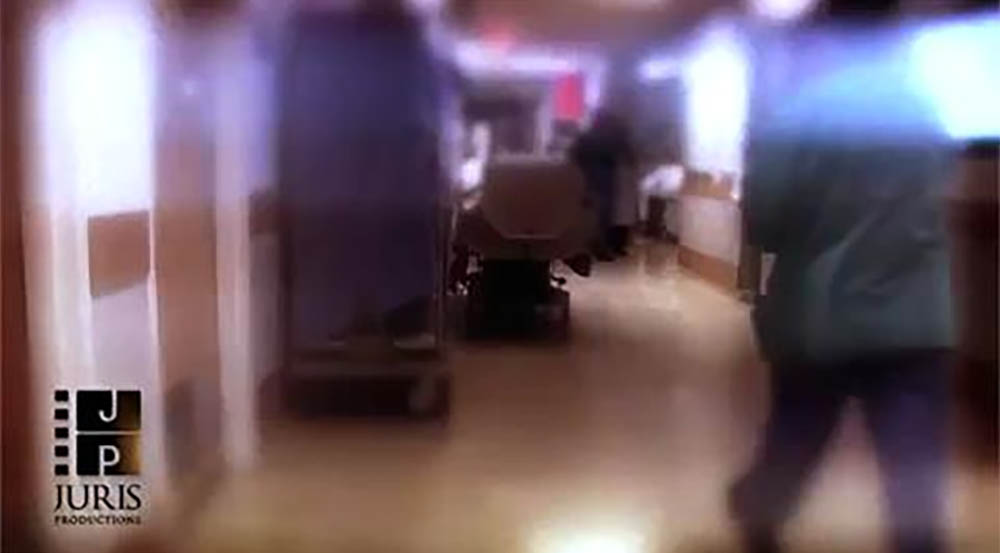
Conal Doyle, 2014 Consumer Attorney of the Year Finalist
Conal Doyle explains the case involving his client’s spinal injury during surgery. His focus on increasing the standard of care lead to his 2014 nomination. Information about Conal and Doyle Law can be found at www.conaldoylelaw.com or 310-385-0567.
[MUSIC PLAYING]
ATTORNEY: When we got this case, we discovered that this hospital out in Bakersfield hired really inexperienced and inadequately trained and certified neurodiagnostic technicians to monitor the spine during spinal surgery to provide a layer of safety for patients. As a result, in this case, our client, unfortunately, Charlene McKnight, was rendered a paraplegic for life due to a bone fragment coming loose during surgery and compressing her cord. The first huge challenge in this case was to figure out a way to get around MICRA. We had a phenomenally simple, just plain-language argument that, look, these technicians aren’t part of the code and, therefore, MICRA doesn’t apply, and we wanted summary adjudication. We were able to recover tremendous non-economic damages for Ms. McKnight, who was able to collect it. We wanted to get these poorly certified, poorly trained technicians from this side of the room all the way over here put to practice where the really good technicians, the good medical providers, were practicing at that standard of care. So the only way to do that in cases like this is just to use the power of the trail courts. So that’s kind of what we do for our clients. This client really wanted to try to ensure that other folks wouldn’t meet her fate, and this jury really sent a loud, loud message with their verdict. That this is not the way that medicine should be practiced in Kern county or throughout the state.
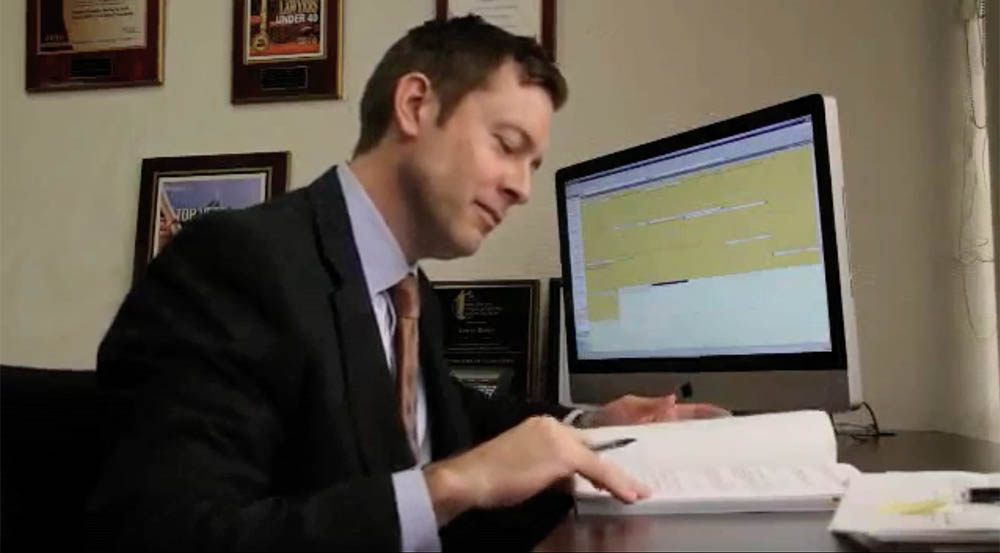
Conal Doyle, 2011 Consumer Attorney of the Year Finalist
Conal Doyle shares Francisco Castañeda’s story and the legal action against DIHS. This provided a catalyst to the reform of the immigration detention system.
[MUSIC PLAYING]
ATTORNEY: When we got this case, we discovered that this hospital out in Bakersfield hired really inexperienced and inadequately trained and certified neurodiagnostic technicians to monitor the spine during spinal surgery to provide a layer of safety for patients. As a result, in this case, our client, unfortunately, Charlene McKnight, was rendered a paraplegic for life due to a bone fragment coming loose during surgery and compressing her cord. The first huge challenge in this case was to figure out a way to get around MICRA. We had a phenomenally simple, just plain-language argument that, look, these technicians aren’t part of the code and, therefore, MICRA doesn’t apply, and we wanted summary adjudication. We were able to recover tremendous non-economic damages for Ms. McKnight, who was able to collect it. We wanted to get these poorly certified, poorly trained technicians from this side of the room all the way over here put to practice where the really good technicians, the good medical providers, were practicing at that standard of care. So the only way to do that in cases like this is just to use the power of the trail courts. So that’s kind of what we do for our clients. This client really wanted to try to ensure that other folks wouldn’t meet her fate, and this jury really sent a loud, loud message with their verdict. That this is not the way that medicine should be practiced in Kern county or throughout the state.
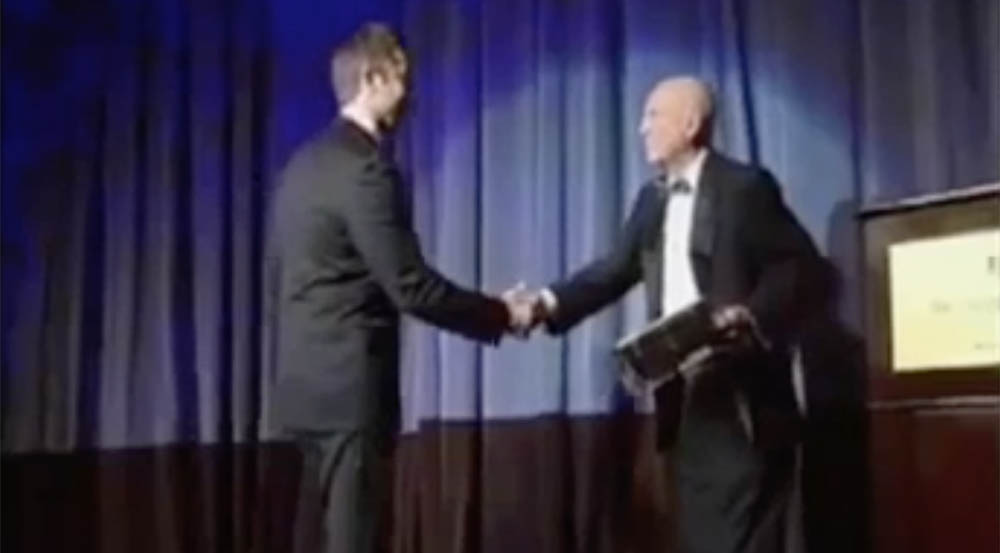
CAALA Trial Lawyer of the Year 2011 – Introduction of Conal Doyle
Doyle Law is recognized as the CAALA Trial Lawyer of the year for the Castañeda Case. Tom Dempsey delivers the introduction of Conal Doyle. www.conaldoylelaw.com or call 310-385-0567.
ANNOUNCER: Ladies and gentlemen, please welcome Consumer Attorneys Association of Los Angeles 1993 President Tom Dempsey.
[MUSIC PLAYING]
THOMAS DEMPSEY: Good evening. I want to thank everybody for coming also. This is always a great event. It’s just always terrific. Tonight’s honoree, Conal Doyle, I met approximately four and a half years ago. At that time, I was the president of Trial Lawyers for Public Justice, as it was called at that time, something Bruce Broillet got me involved in. And we had a client by name of Francisco Castaneda, who was in federal custody with the Immigration and Consumer Enforcement. The acronym is ICE, and what an appropriate acronym. They are some of the most cold-hearted people I have ever come across. In any event, Conal had a national practice, a very lucrative national practice. But he was based principally in California. And he had some unique experience in that he tried both civil rights and medical malpractice cases. And that’s what this was about. These were actually the skills that we were looking for, so Conal was recruited as lead counsel to work with various attorneys with Public Justice. Let me give you just a little background summary of the case. Francisco had come to this country with his parents at 10 years old. Over the years, had gotten in some trouble and was actually in state custody, was arrested. And developed a lesion on his penis. It continued to get worse, and a biopsy to determine whether this was any cancerous condition was recommended. Well, the state never got around to it. He was then transferred to federal authorities to determine whether or not he would be deported. The condition kept getting worse. The lesion got more aggravated, got more ugly, got more painful. Obviously, it was something serious. Under the federal government, however, when you’re an immigration detainee, that system only provides what’s called extraordinary medical care, such as a biopsy, if you have an injury or an illness that requires extraordinary care and is threatening to life and limb. Well, of course, until they had the biopsy, you couldn’t tell whether cancer, which would be deadly, was his condition. And he couldn’t get the extraordinary care. So in this Kafkaskian nightmare that he went through for months and months– I think it ended up being something like 14 months– the emotional and psychological damage that was being done to him as well as the physical of having this festering condition, pleading for a biopsy, and nobody being able to give it to you because of this catch-22 situation. Well, Conal took over this case, and it became a quest, a quest to change this unbelievably unjust situation. Filed in the state court. Filed in federal court. Two parallel claims. In the federal court, the government made a motion to dismiss the case on immunities. It was denied. Judge Pregerson, a very, very good judge, described this situation as being, quote/unquote, the definition of cruel and unusual punishment. Winning at the district court, they appealed to the Ninth District. We won there again. Well, it just so happens that the nation, the United States, was becoming more interested in the abuses in federal immigration detention situations. In this very hotel, Conal and I sat down was Scott Pelley of 60 Minutes and gave an interview that was actually played on 60 Minutes about not only this case, but other cases where immigration detainees were being abused in one form or another. As the national interest grew in this, LA Times had articles, New York Times had articles. The Washington Post actually started a whole investigative study on this. And in addition to being barraged by paper, by numerous depositions– Conal must have taken 20, 30, 40 depositions, some of which he’d be the only plaintiff’s attorney, and there’d be 12 other attorneys representing various aspects of the government. He would get threatening phone calls. Anything like this brings out sometimes the worst in people. And the anti-immigration forces were sending death threats to him. “How can you represent somebody that doesn’t belong in this country to begin with?” “They deserve whatever they get.” Et cetera, et cetera, et cetera. Having won at the Ninth Circuit, we moved on to the Supreme Court. And unlike the Supreme Court when I went to law school as being the court of last resort, where whatever happened to you in the lower courts, there you were going to find justice, here Conal actually succeeded in uniting that court. It was a 9-0 verdict against us. Unbelievable, but that’s the way it was. Now, many attorneys at that point, would have packed up their tent, said, you know what. I’m dropping this case. I’m going to take a settlement for whatever I can get. I’m out of here. Not Conal Doyle. He doggedly kept at this. Deposition after deposition, building evidence, evidence, evidence. Until finally, in November, 2010, went to trial in the case on the state case. And going into the case before the Supreme Court decision, the offer had been from the state about $100,000. After the Supreme Court decision, apparently it emboldened the state attorneys, and they dropped it to $10,000. So going into trial, he had a $10,000 offer. Well, fortunately, the jury didn’t see it that way and came back with a seven-figure verdict. Shortly after that, the government got cold feet, the United States, and they settled for a seven-figure verdict. But that wasn’t the point. The point was that government changed that policy. Immigration detainees now have the right to medical care. The quest was fulfilled. Conal succeeded in innumerate immigration detainees not suffering the same kind of emotional, psychological, and physical injury that Francisco did. We’ve been bombarded over the last years and years and years about trial attorney bar organizations being nothing but a bunch of self-serving, self-interested, greedy, money-grubbing trial lawyers. Tonight, at least for tonight, that myth has been destroyed. All the propagandizing of the public has been destroyed. It is so significant that CAALA chose a trial attorney who gave extraordinary time, effort, financial support to someone who, in our society, is probably among the weakest and the most vulnerable, somebody whose voice would not be heard in our judicial system or anywhere else but for Conal Doyle. I take great pride in awarding tonight– or presenting tonight to Conal Doyle the 2011 Charlie O’Reilly Trial Lawyer of the Year Award. Conal. And Charlie, wherever you are, you’ve got to be smiling, because it’s one of your [INAUDIBLE] that is getting this award, another Irishman.
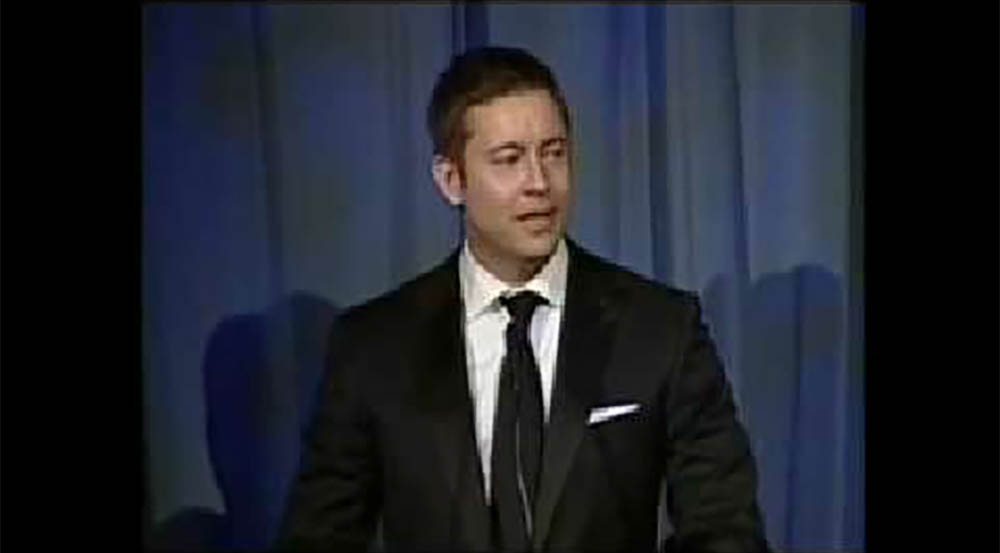
CAALA Trial Lawyer of the Year 2011 – Conal Doyle Acceptance Speech
Doyle Law is recognized as the CAALA Trial Lawyer of the year for the Castañeda Case. Conal Doyle delivers the acceptance speech.
ATTORNEY: Tom, thank you very much for those kind words. I’m always a little bit uncomfortable being recognized like this, because in our business when you get an award like this it means that a family has suffered a tragedy. And that’s certainly true in this case. And the Castaneda family, Francisco’s daughter, Vanessa, and his sister, Yani, are here with us tonight. Thank you. [APPLAUSE] Yani and Vanessa, thank you for allowing me to enjoy this award tonight. And tonight is a special night because there’s no higher praise than being recognized by your peers. And this award in particular is undoubtedly one of the highest honors any trial lawyer can receive. But we’re here tonight to recognize and celebrate the great power and responsibility that we all have to affect change through the courts. And the courts really are the great equalizer. I think they are the last frontier, the one place where money and politics can’t buy justice, and for me the Castaneda cases epitomize the power of the courts and the daily struggles that we all go through to bring justice to our clients. But before talk about the cases, some well-deserved acknowledgements are in order first I’d like to thank the CAALA board of directors. I know that many of you didn’t know me very well and some not at all when you voted on this award this past October. And because of that, this award means even more to me and I also think that it speaks volumes about the integrity of the board and the process that brought me to this podium tonight. The other thing I’d like to do briefly is to recognize the other finalists for this award, who or sometimes forgotten on this night because every one of them deserved to be standing up here tonight, and they made tremendous contributions to the civil justice system this past year. Adam Shea, Carney Shegerian, Matt McNicholas, and Greg Smith. [APPLAUSE] The quest that we undertook, as Tom described it, was not accomplished alone, and although this is a night to celebrate CALA, I would be remiss if I didn’t recognize another organization that is at the forefront for the fight for justice, and that organization is Public Justice. [APPLAUSE] Public Justice is led by Arthur Bryant, and we heard earlier this evening and his wife, Nancy, passed away this morning. And when the going got tough in this case, it was all hands on deck with many contributions from the organization. Amy Radon did fantastic work on this case. Arthur Bryant himself and Leslie Brockner pitched in when we were drafting our Supreme Court briefs. And Adele Kimmel was really the driving force in this case. But I’d really like to single out two people. Number one is Tom Dempsey. [APPLAUSE] Tom, thank you for selflessly donating your time to this case and for coming up with just the right theme or analogy just when we needed it. And Adele Kimmel. Adele, you really deserve to be standing up here beside me in receiving this award. You were my right hand from the beginning of this case, and your boundless energy and enthusiasm for this cause is astonishing. And you never have a great result and a great case without fantastic clients. Yani, I admire you so much for your loyalty and dedication to Francisco, taking care of him during his last year of life. And Vanessa Castaneda. Vanessa, I’m so proud of you. You’re a wonderful woman. You have a limitless future and Vanessa is getting her associate’s degree tomorrow morning at 9:30 and she just bump for flight back tonight to stay– [APPLAUSE] –and hear me speak. And the finally I like to recognize my parents who are immigrants, as am I, although I think I’m listed in the brochure is being born in Connecticut. They are from Ireland and Canada. The first time they ever saw me in court was being absolutely skewered by Justice Scalia and his friends in Washington, DC. It really wasn’t a great day for me, but I’m glad you could see me here in front of a friendlier audience, or at least one that doesn’t talk back, and Justice Turner, just– okay? So Mom and Dad, thank you for always believing in me. [APPLAUSE] In some ways the Castaneda cases illustrate both the best and the worst in our system. I was shocked to find out how the United States had turned its back on the immigrant detainee population, a truly powerless and voiceless group. The executive branch of government failed Mr. Castaneda. We appeared before Congress and testified to try to get a change in policy and Congress did nothing. The Supreme Court turned us away. But the trial courts provided the family justice when no one else would. And we sought to convince a Los Angeles jury that you judge the degree of civilization in a society by entering its prisons. But they didn’t really, surprisingly enough, require much convincing. They knew what our government apparently didn’t, and the reason why a Los Angeles jury issued a shot really heard around the world was because the jury system works for everyone when we as trial lawyers take on the fight that others won’t. And before I conclude my remarks, I want to tell you a quick story that I think encapsulates how I feel about these cases. Let me take you back to January, 2008. It was the deposition of Francisco Castaneda and it was literally on his deathbed. He died two to three weeks after this deposition. And I drive across town deep into East L.A. to his sister Yani’s house. And it’s a humble but very well kept apartment, and Yani had cleared out the living room and head erected a sort of a bed and a cot the corner of the house. I enter the house and I see that Francisco is covered up and he’s shivering and he can no longer walk. His body had been ravaged by cancer. But although he could barely speak, he has a message for me, and I lean over because he can just speak in a whisper. And he says to me, “Make sure that my suffering is not forgotten. I don’t want anybody else to ever go through what I went through.” And I promised him that day that I would I do everything in my power to bring his family justice and change the policy for provisioning of medical care to immigration detainees. A filmmaker friend of mine has just completed a documentary called Speak. It’s a great film, and it’s about the 2008 world championship in public speaking. And I was recently at the film screening and the woman who won it, LaShunda Rundles, suffered from terminal illness, and she said, “We aren’t half afraid of dying as we are that no one will remember that we were ever here.” And that was Francisco’s fear on his deathbed. And LaShunda talked about passing from life into death, and she said, “Our words are like seeds that we can sow on this side to make our lives immortal.” And that is the gift that we give our clients. We ensure that their tragedies are not forgotten and honor their suffering with safer products, better medicine, and equal rights for all of us. The jury verdict in this case fulfilled my promise to Francisco and so do nights like this. Thank you so much for honoring his memory, and tonight certainly is a highlight of my career because of the incredible lawyers that have preceded me at this podium. And give you an idea of the incredible power of persuasion of last year’s winner, Ricardo convinced me, against my Irish better judgment, not to drink anything before the speech tonight. I do plan to catch up to you all in the next couple of hours, so please– and I promise to be a little bit less somber and serious. So come and join us for a drink and celebrate Francisco’s memory. Thank you. [APPLAUSE]











